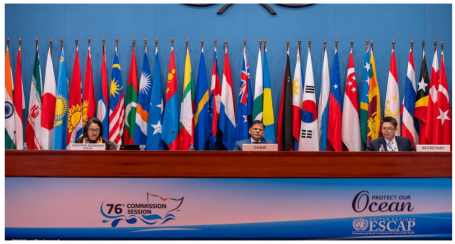
For the first time in history, the annual United Nations regional assembly was held on a fully virtual platform. The online session drew active participation from over 264 delegates representing 54 of the Commission’s 62 member States and associate members along with 8 additional observer countries.
Several leaders from around the region addressed the session: Prime Minister Gen. Prayut Chan-o-cha of Thailand delivered a statement on behalf of the host government, while Prime Minister Sheikh Hasina of Bangladesh, Prime Minister Josaia Voreqe Bainimarama of Fiji and Prime Minister Kausea Natano of Tuvalu, who also spoke on behalf of the Pacific Islands Forum, delivered statements from their capitals. Foreign Affairs Minister Damdin Tsogtbaatar of Mongolia, who chaired the 2019 session, opened the meeting, and recalled the work of the Commission over the past year. While voicing grave concerns about the complexities and growing threats of COVID-19 on sustainable development, all leaders expressed their optimism that recovery will provide the opportunity to strengthen resilience and build a more equal, inclusive, and sustainable Asia-Pacific region.
Deliberations this year focused on the theme ‘Promoting economic, social and environmental cooperation on oceans for sustainable development.’ Towards this end, countries endorsed a resolution to conserve and sustainably use oceans and marine resources in the region. The resolution calls for countries to strengthen regional cooperation and redouble efforts to reduce marine pollution, improve ocean data and statistics, and support sustainable maritime connectivity. Countries also agreed to boost public-private and civil society partnerships in the sustainable management of fisheries, aquaculture, and tourism to increase economic benefits for small island developing States and least developed countries. The commission also encouraged small island developing states to take full advantage of their blue, economy, especially in the fisheries and tourism sectors, to foster their sustainable development.
COVID-19 is already ranking high tolls on the region. Most economies experienced contractions during the first four months of 2020 and millions of people are projected to fall into extreme poverty.
Delegates at the APFSD this year reviewed six key transformative entry points to accelerate progress towards the SDGs. They are: 1) human well-being and capabilities; 2) sustainable and just economies; 3) food systems and nutrition patterns; 4) enhancing power grid connectivity to achieve affordable and clean energy for all; 5) urban and peri-urban development; and 6) global environmental commons.
On the sidelines, ESCAP, the Asian Development Bank (ADB) and United Nations Development Programme (UNDP) jointly launched the latest edition of the Asia-Pacific SDG Partnership
Report - Fast-Tracking the Sustainable Development Goals: Driving Asia-Pacific Transformations. The report highlights strategies to accelerate transformation and helps countries compare their speed of progress with others. It calls for clear direction, removing systemic barriers, investing in institutional and public readiness to change, and upgrading policymaking approaches to manage increasingly complex development challenges.
One of the report’s key findings is that higher income is not a silver bullet to address the challenges posed by SDGs and achieve accelerated progress along transformative pathways. Low-income and lower middle-income countries emerged as some of the fastest-moving countries in the region.
Since 2014, the Asia-Pacific Forum on Sustainable Development 2020 has provided a unique annual platform for countries in Asia and the Pacific to share perspectives, challenges, and best practices as they progress toward implementing the SDGs. Outcomes from APFSD will provide input into the global discussions held at the HLPF in July this year.
